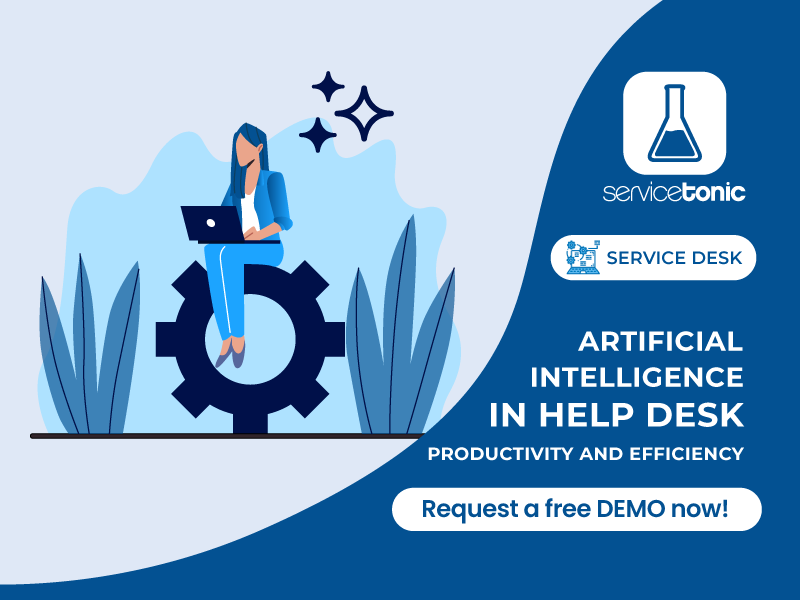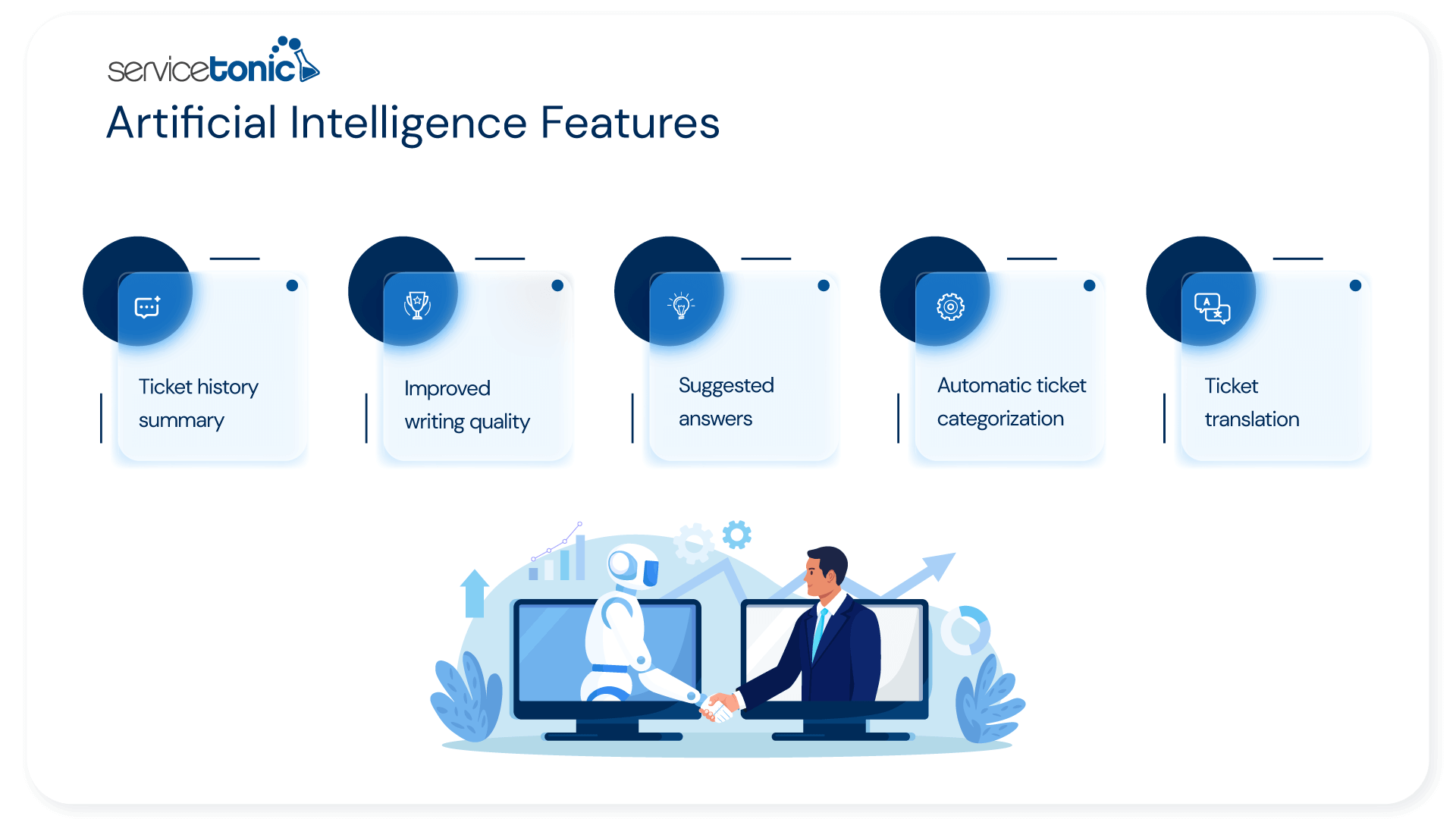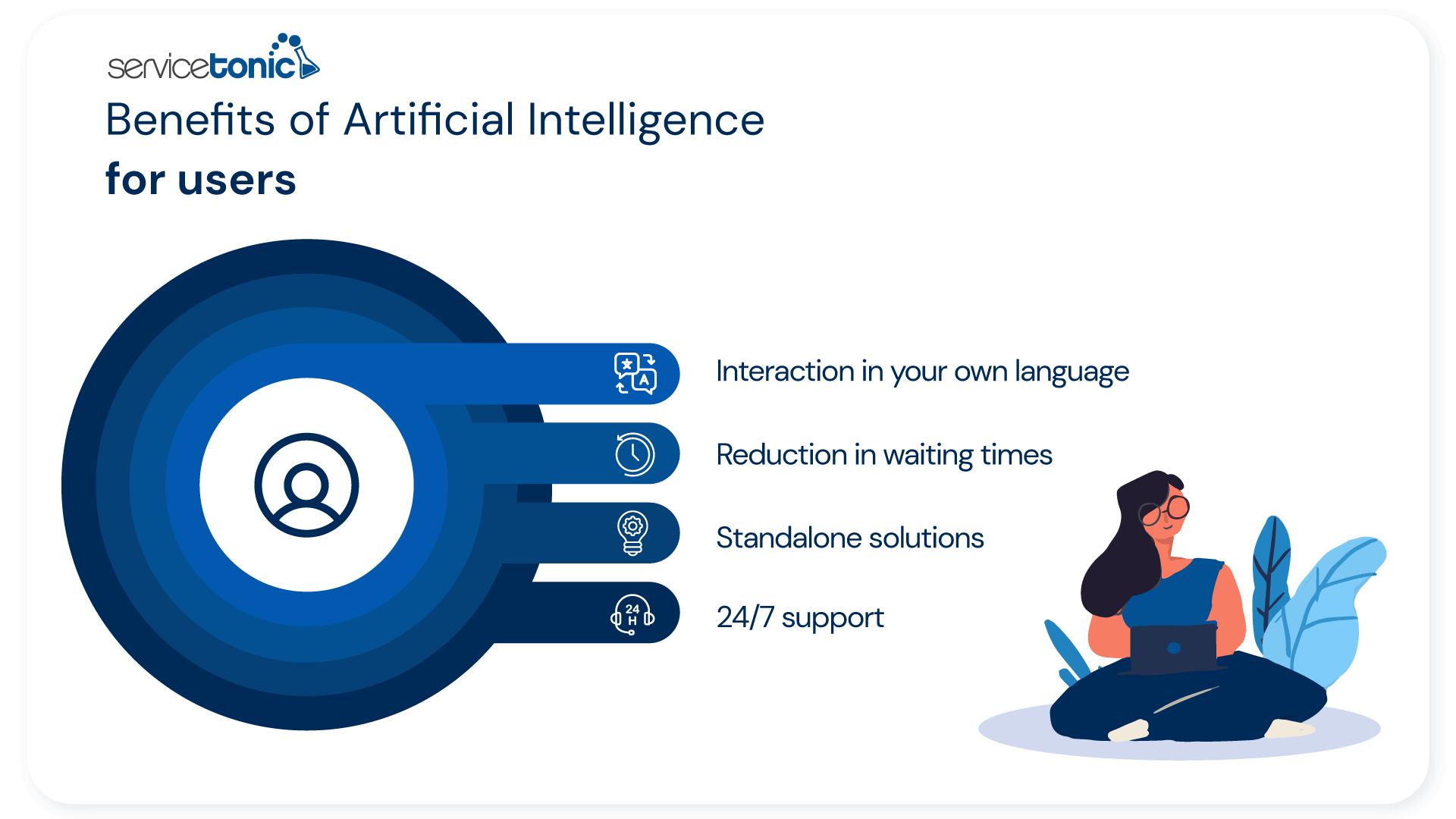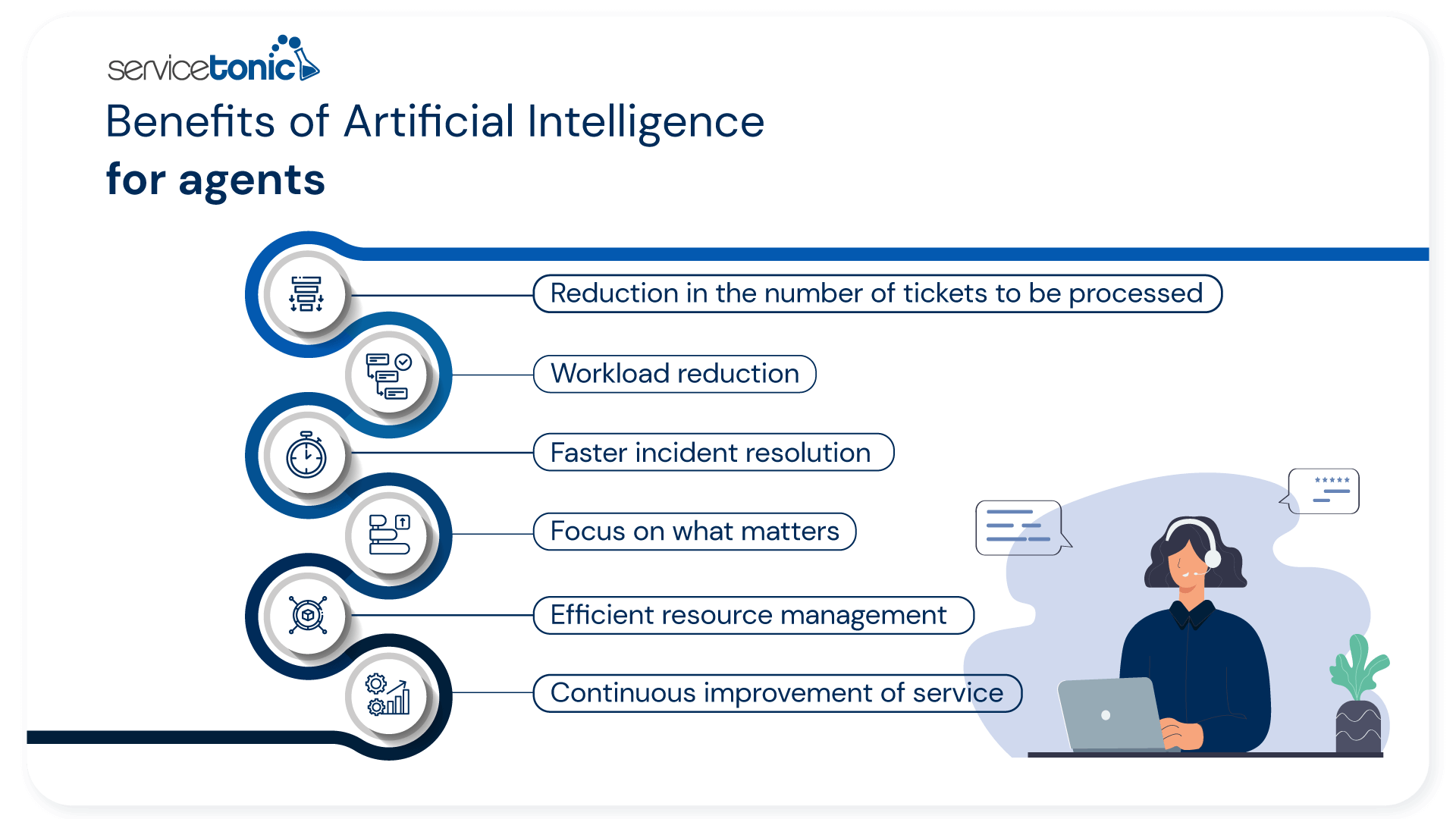
Having a Help Desk with AI has become an essential element for any organization seeking to optimize request management and offer faster and more effective customer service. Thanks to automation and the smart use of data, these solutions allow for agile and continuous responses, with 24/7 availability, and incident management via a centralized ticketing system.
Today, investing in an AI-powered Help Desk is no longer a luxury but a strategic decision for any company aiming to ensure more efficient support, improve the user experience, and align support processes with business goals.
AI tools applied to Help Desk software significantly improve the user experience (both internal and external) and streamline agent work. Incident management shifts from being purely reactive to a system capable of understanding context and offering smarter, more accurate responses.
Thanks to AI, companies can provide more agile support, respond in the customer’s language, and transfer tickets between agents without losing critical information. This is possible because AI automatically generates ticket history summaries, allowing any agent to quickly understand what has been discussed with the customer and continue the conversation without interruption.
Artificial Intelligence in Help Desk software enhances user experience, both internal and external, while streamlining agent tasks. It’s no longer just about managing incidents; it’s about understanding the context and providing smarter responses.Thanks to AI, companies can offer agile and precise support, respond in the customer’s language, and transfer tickets between agents without losing key information. This is possible because AI generates an automatic summary of the ticket history, enabling agents to catch up quickly on what has already been discussed with the customer.
In addition to agents, users also directly benefit from AI in Help Desk software, as they can receive immediate answers to their inquiries via the User Portal, Chatbot, or even email or WhatsApp with the AI Agents or Virtual Assistants available 24/7. These agents are trained with specific company information, allowing them to provide precise, up-to-date responses aligned with internal processes.
Thanks to AI, companies can offer intelligent self-service, optimize customer service, and improve agent workflows, all from a single platform.
Table of Contents
AI Features
The capabilities of AI in ServiceTonic are divided into two main areas: functionalities designed for support agents and solutions aimed at improving the experience of end-users.
For users, it’s possible to set up multiple intelligent Virtual Agents, integrated in the User Portal, Chatbot, email, or WhatsApp, to provide immediate and accurate responses.
These agents are configured by the support team without the need for programming and can be trained using various internal company sources, such as documentation, specific URLs, knowledge bases, or even previous ticket histories. This way, users receive personalized assistance available 24/7, without human intervention.
For agents, they benefit from a Copilot with the following features to assist them in their support tasks:
- Ticket history summary: Thanks to ServiceTonic’s Copilot, agents can view a ticket summary, which makes it easier to understand and accelerates resolution.
- Improved response drafting: Response drafting is now more precise, better structured, and free of errors, improving the customer’s perception of the company.
- Suggested responses: AI searches the Knowledge Base, internal documentation, URLs, and ticket histories to suggest the best solution to the agent.
- Automatic ticket categorization: AI can automatically categorize a ticket, minimizing the risk of errors in categorization and reducing management time.
- Ticket translation: Thanks to Copilot, agents can communicate with users in multiple languages, as the system automatically translates incoming messages and outgoing responses.

Benefits of Incorporating AI in Help Desk Software
Incorporating AI in ServiceTonic not only enhances operational efficiency but also completely transforms the way customer service is managed.
In this way, its implementation benefits both users and agents:
Benefits for Users
Thanks to the ability to train Virtual Agents or personalized AI Agents using internal documentation, URLs, ticket histories, and Knowledge Base, users gain several benefits when making inquiries via the User Portal or Chatbot.
- 24/7 support: The integrated virtual assistant allows users to get help in natural language at any time of day, even outside business hours, ensuring continuous support without interruptions.
- Autonomous solutions: Most common inquiries can be resolved autonomously by the user, thanks to AI, without human intervention, speeding up the user experience.
- Reduced wait times: With automatic responses and solution suggestions, users no longer have to wait long for an initial response or action.
- Interaction in their native language: Automatic message translation allows users to communicate in their native language, facilitating problem understanding and reducing misunderstandings.

Benefits for Agents
It’s important to note that AI doesn’t replace the human team but rather assists them in their work. Thus, incorporating AI into Help Desk software provides multiple benefits for agents:
- Reduction in the number of tickets to process: Virtual agents reduce the number of tickets the support team has to manage.
- Reduced workload: Routine tasks like categorization, message translation, summary creation, and initial drafting are automated, allowing for more efficient handling of daily ticket volume.
- Faster issue resolution: With automatic summaries and response suggestions, agents spend less time reading or drafting messages. They can route each ticket to the correct solution with a few clicks, significantly speeding up resolution times.
- Focus on the important: By freeing agents from repetitive tasks (basic drafting, simple queries, categorization), the support team can focus on more complex and high-impact issues. AI complements human work, acting as the first level filter, optimizing the use of specialized resources.
- Efficient resource management: Automatic multilingual support eliminates the need for agents specialized in each language. The system translates content on the fly, enabling the same support team to assist global users. Additionally, automatic categorization organizes work without manual intervention, preventing errors in task distribution.
- Continuous service improvement: With immediate access to accumulated information (ticket histories, knowledge bases, files, links…), the team can detect trends and improve their processes.

Conclusions
Artificial Intelligence has arrived to transform support service.
At ServiceTonic, we understand that businesses need agile, personalized, and scalable solutions to stay competitive. That’s why we’ve integrated AI into our Help Desk software, enabling:
- Immediate, automated responses through self-service
- Reduced operational load for the support team
- Improved quality and consistency in service
- Multilingual support without complications
- Intelligent ticket summary and categorization
In short, it’s about offering more value with less effort and preparing your organization for current and future challenges.
FAQ
What is an AI-powered Help Desk?
An AI-powered Help Desk is a support system that integrates AI Agents or Virtual Assistants and Copilot, aimed at improving incident management and optimizing customer service.
Artificial Intelligence in Help Desk software allows users to find immediate answers to their inquiries through tools like chatbots or the User Portal, thus increasing satisfaction and reducing the number of tickets opened. Support teams, via Copilot, can improve response drafting, summarize ticket histories, reply in the customer’s language, and propose solutions to inquiries.
Thanks to Artificial Intelligence, Help Desk streamlines the work of the support team, reduces response times, and enhances the user experience with faster, more precise, and proactive service.
Can I calculate the savings from using AI for the support team?
Calculating savings is always difficult, which is why ServiceTonic has designed the AI Calculator, which allows you to get an approximate idea of what your organization could save.
What information sources can be used to train Virtual Agents?
A Virtual Agent can be trained from multiple information sources that are part of the organization’s knowledge management.
This includes internal documentation in PDF, XLS formats, articles from the knowledge base, custom URLs, and previous ticket histories or user interactions.
The more structured and relevant information the Virtual Agent or AI Agent receives, the more precise, consistent, and useful their answers will be when offering customer service and technical support.
How do you train a Virtual Agent or AI Agent?
Training an AI Agent in ServiceTonic is a very simple process that requires no programming knowledge and aims to improve service quality and user support.
Simply access the AI configuration and add the files from which the assistant will obtain its answers, such as user manuals, guides, or internal documentation. URLs from the help center or other relevant sources can also be defined for the Virtual Agent to use as a reference.
There’s also the option to enable or disable the review of already opened tickets so the system can detect similar requests and learn from previous solutions offered.
In this way, the AI Agent is fed with real and updated knowledge to provide increasingly accurate and useful answers.
How many AI Agents can I have?
In ServiceTonic, you can create as many AI Agents as your organization needs, without limitations. Additionally, these AI Agents can be linked to agent roles and user criteria, allowing the platform to offer responses tailored to each person’s profile.
Thus, AI can respond with the most appropriate AI Agent for each case, ensuring more precise, contextualized, and department-aligned user support.
Which languages are available for translations?
ServiceTonic offers automatic translations in 15 languages, enabling better service for users from different countries. The available languages are: Brazilian, Catalan, Chinese, Traditional Chinese, Czech, Polish, Spanish, French, English, Italian, Korean, Dutch, German, Portuguese, and Swedish.
This wide linguistic coverage ensures more inclusive, fluid, and context-adapted user support.
Can I edit the responses generated by the AI before sending them?
Yes. AI suggests responses, but the agent always has the option to review, edit, or write their own response.
